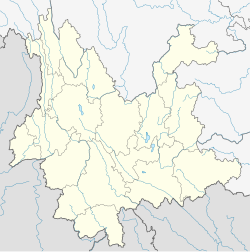Mengla County
|
Mengla County 勐腊县 |
|
|---|---|
| County | |

Traffic in the town of Mengla
|
|
 Location of Mengla County (pink) within Xishuangbanna Prefecture (yellow) and Yunnan |
|
| Location of the seat in Yunnan | |
| Coordinates: 21°28′N 101°35′E / 21.467°N 101.583°E | |
| Country | People's Republic of China |
| Province | Yunnan |
| Prefecture | Xishuangbanna |
| 532823 | |
| Area | |
| • Total | 7,056 km2 (2,724 sq mi) |
| Population | |
| • Total | 194,360 |
| • Density | 28/km2 (71/sq mi) |
| Time zone | China Standard (UTC+8) |
| Postal code | 666300 |
| Area code(s) | 0691 |
| Website | http://www.mlzf.yn.gov.cn/ |
|
1Yunnan Statistics Bureau [1] 2Xishuangbanna Gov. [2] 3Yunnan Portal [3] |
|
Mengla County (simplified Chinese: 勐腊县; traditional Chinese: 猛臘縣; pinyin: Měnglà Xiàn; Thai: เมิ้งล่า, เมืองหล้า) is a county under the jurisdiction of the Xishuangbanna Dai Autonomous Prefecture, in far southern Yunnan province, China. Meng is a variation of Mueang.
Xishuangbanna Tropical Botanical Garden, of the Chinese Academy of Sciences (CAS), is located in Menglun in Mengla County, covering an area of more than 1000 ha. Over 13,000 species of tropical plants are preserved in its 35 living collections.
The last Indochinese tiger in the wild in China is believed to have been killed near Mengla in 2009. The perpetrator is believed to have been sentenced to 12 years imprisonment for this.
A tiny frog, Raorchestes menglaensis (known as the Zhishihe's bubble-nest frog or Mengla small treefrog) is only known from its type locality, Zhishihe in Mengla County.
Mengla has a borderline tropical wet and dry climate and a humid subtropical climate (Köppen Aw and Cwa, respectively). The city has a generally humid climate with strong monsoonal influences. Summer is long and there is virtually no "winter" as such; instead, there is a dry season (December thru April) and wet season (May thru October). The coolest month is December, averaging 17.9 °C (64.2 °F), while the warmest is June, at 26.4 °C (79.5 °F); the annual mean is 23.1 °C (73.6 °F). However, high temperatures reach their peak in April before the onset of the monsoon from the Indian Ocean.
...
Wikipedia

